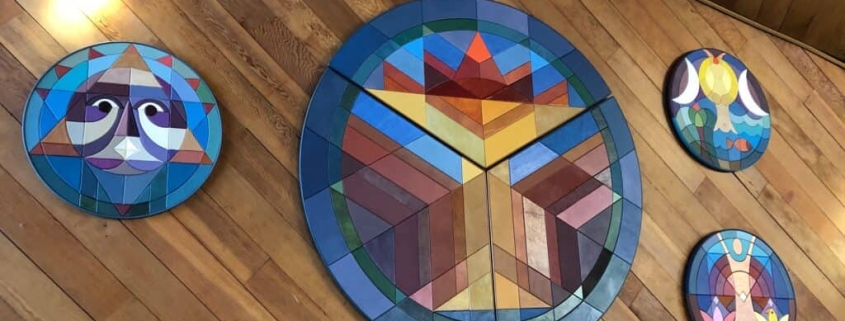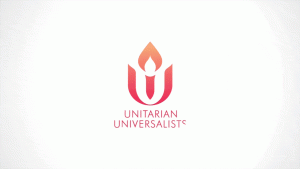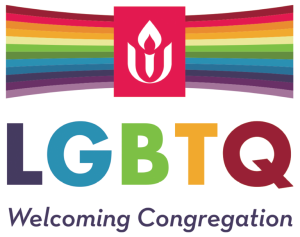
The first principle: The inherent worth and dignity of every person
An interview with Dr. Terry Mihlbauer, who is a psychologist.
Terry, given your profession, and in light of your own religious background, when you were learning about Unitarian Universalism, how did the first principle speak to you?
The first principle, the inherent worth and dignity of every person, is comprehensive. I consider it to be the most central and important principle to follow in my thoughts, feelings and actions. It is a very difficult standard to live by. In reading Brene’ Brown, her words seem to capture what the principle means to me: that you and others not only feel seen, heard and valued, but you also can give and receive without judgment. It means everyone belongs and should be able to present their authentic, imperfect, whole selves and be seen as having worth and dignity.
I think the first time I questioned the Catholic beliefs I grew up with was in grade school. I couldn’t imagine that my friends who were not Catholic would receive the ultimate judgment when they died – that they would go to hell! They didn’t seem any different than me, and I sure wasn’t planning on going to hell. Later the sexism in the Catholic Church also troubled me. I was also noticing that some of those in my “good Catholic family” were racists. When I realized my own worth and dignity did not depend on parental approval of my religious beliefs, I left the Catholic faith.
While I chose my profession long before I became a UU, being a psychologist allows me to incorporate the first principle into my work. Mind you, the core of my initial training was in what Carl Rogers called “unconditional positive regard,” as he believed that therapists need to treat clients with dignity, compassion and respect and to focus on the person, not on their problems. It came naturally to me to offer this to children and women; it took a lot more practice to be able to do this with all of my clients.
As one person, a former nun, said to us in a training seminar, “We all want to find the saints and sinners.” She was referring to “saints and sinners” in our families of origin, but actually don’t we all want to sort everyone out into good people and bad people and feel smugly in the “good people” group?
It is a puzzle to me, a challenge, to think about others and what they value and what they need, and how I can fit into that puzzle. It is easier to do this when others are open about what they like or don’t like, what has caused them emotional pain or distress, and what brings them great joy.
So for me it is in the detail. To demonstrate that I believe in the worth and dignity of another person requires that I really know them and see them as unique. If I don’t notice what is important to that person, how will I ever treat them in a way that they experience our interaction as one in which I do convey to them that I believe they have worth and dignity?
I think my dignity and worth comes from helping others. I know when I have not lived into this principle, if I have guilt or shame, I stop feeling that I have worth. Without a sense of your own worth it is very difficult to be mentally healthy or to be able to treat others as if they have worth. It is all so interconnected: we need to experience relationships as respectful of us no matter what our shortcomings are, and we need to treat others with dignity, compassion and respect (like Carl Rogers said) no matter what their shortcomings are.
I assume you have worked with many people who have disturbing or even dangerous personalities. Please tell us how your faith in the first principle ties in with your professional ethics in such situations. How do you maintain your belief in each person’s inherent worth and dignity?
I had my most difficult struggle with clients long before I was a UU. The first time I was working with adult sex offenders I told myself I had no trouble in providing victims with unconditional positive regard, but offenders? I had to work that out.
I was doing group therapy with adult males who had sexually abused children in their own families. At the same time I was working with children who had been sexually abused by someone in their family — usually their father or stepfather. How could I do this work? How could I help someone that I felt complete disgust, even rage, at, for the horrible things they did?
I was not working with violent offenders (when physical abuse was also present) so this wasn’t even the worst case scenario. What I came to find is that once I knew these men, and I heard their stories, and I experienced them as people, it was so much easier to come into the room and treat them with respect and dignity. It wasn’t that I was rude to them. It was more in my tone, posture and many of the indirect ways I was surely letting them know that I thought very little of them. I am not sure if any of them would have identified me as treating them any differently than how most in society thought of them – the lowest of low.
Since becoming a UU and reading Bryan Stevenson, I find his words really help with this struggle: “Each of us is more than the worst thing we have ever done.” This quote helps me lead with “positive intent,” which means roughly that I try to believe that everyone is doing the best they can with what they have. I also try to remember that we are rarely as good as the best thing we’ve done and neither are we as bad as the worst thing that we’ve ever done.
If I can remain humble, see myself as a flawed human being who has made her fair share of mistakes, it is so much easier to see others as having worth and dignity, no matter what their mistakes or flaws are. I try to follow the nun’s advice and not divide people up into good and bad categories.
When it comes to sociopaths and violent offenders I will probably never attain the thoughts and feelings toward them that I aspire to. The first principle reminds us that when it is all said and done, to be a good human being you need to believe in the inherent worth and dignity of every person and that our actions reflect that belief.
How does the first principle help you develop your beliefs on such difficult matters as abortion, criminal punishment and euthanasia?
I believe the first principle is consistent with women having reproductive rights. If we see women as having worth and we do not judge them, we honor their wisdom about their own bodies, including if they choose abortion. If we treat them with dignity we don’t shame them or see them as criminals. I have not struggled with being compassionate with women I have known who have chosen abortion. I have struggled with the tactics of the Right to Life protesters.
Prisons are full of people with addictions, mental health problems, and histories of trauma and victimization. Until our treatment of those who commit crimes lines up with our first UU principle, we are perpetuating a cycle of hurt people hurting people.
To what extent has the first principle guided your volunteer work, both in the congregation and in the wider community?
My volunteering has evolved from seeing it as an opportunity to learn more about my profession and to “give back” by volunteering for organizations whose mission is similar to the UU first principle. I joined the A. Philip Randolph Institute as its mission is to fight for racial equity and economic justice. I have volunteered for Voter Registration, as seeing everyone has the right to vote is seeing everyone as having worth, and this too is consistent with the first principle. In our congregation at UUCFW I find that the Racial Justice team has given me opportunities to live out the first principle.



